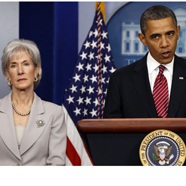Obama compromise on mandate ‘unacceptable,’ say U.S. bishops

Photo Caption: U.S. President Barack Obama makes a statement at the White House in Washington Feb. 10 as Secretary of Health and Human Services Kathleen Sebelius looks on.
By: By Nancy Frazier O’Brien, Catholic News Service
WASHINGTON (CNS) — In an move that appears unlikely to end the controversy over a federal mandate that all health insurance plans include contraception and sterilization free of charge, President Barack Obama outlined a plan that would allow religious employers not to offer such services to their employees but would compel insurance companies to do so.
The president announced the policy in a brief statement Feb. 10 but took no questions.
“No women’s health should depend on who she is, who she works for, or how much money she makes,” Obama said. He said the new policy remains faithful to the “core principle” of free preventive care, but also honors the principle of religious freedom, which “as a Christian, I cherish.”
In a statement issued late Feb. 10, the U.S. Conference of Catholic Bishops said Obama’s decision to retain the contraceptive mandate “is both unsupported in the law and remains a grave moral concern.” The conference also said the continued “lack of clear protection for key stakeholders … is unacceptable and must be corrected.”
“The only complete solution to this religious liberty problem is for (the Department of Health and Human Services) to rescind the mandate of these objectionable services,” it added.
In an earlier statement, Cardinal-designate Timothy M. Dolan of New York, USCCB president, called the announcement “a first step in the right direction,” but said “we reserve judgment on the details until we have them.”
“We hope to work with the administration to guarantee that Americans’ consciences and our religious freedom are not harmed by these regulations,” he added.
The USCCB president said Americans of all faiths and of no faith had responded with “remarkable unity” against the HHS mandate because they were “worried about the erosion of religious freedom and governmental intrusion into issues of faith and morals.”
Sister Carol Keehan, a Daughter of Charity who is president and CEO of the Catholic Health Association, praised what she called “a resolution … that protects the religious liberty and conscience rights of Catholic institutions.”
“The framework developed has responded to the issues we identified that needed to be fixed,” she said in a statement. “We are pleased and grateful that the religious liberty and conscience protection needs of so many ministries that serve our country were appreciated enough that an early resolution of this issue was accomplished.”
But U.S. Rep. Chris Smith, R-N.J., a Catholic who has co-chaired the bipartisan Congressional Pro-Life Caucus since 1982, said the policy announced by Obama “is the discredited old policy, dressed up to look like something else.”
He said the requirement that insurance companies provide contraception and sterilization free of charge to all employees of religious organizations would still place the cost ultimately on the religious employers. “Who pays for the insurance policy?” he asked. “The religious employer.”
Obama said he had spoken to Catholic officials directly “from the very beginning of this process” and had promised them that “we would spend the next year working with institutions like Catholic hospitals and Catholic universities to find an equitable solution that protects religious liberty and ensures that every woman has access to the care that she needs.”
He said the policy announced Jan. 20 had prompted “many genuine concerns, … as well as, frankly, the more cynical desire on the part of some to make this into a political football.” Because of that, Obama said, he directed HHS “to speed up the process that had already been envisioned.”
But the USCCB statement said the conference was “not consulted in advance” about the Obama announcement.
“Stepping away from the particulars, we note that today’s proposal continues to involve needless government intrusion in the internal governance of religious institutions, and to threaten government coercion of religious people and groups to violate their most deeply help convictions,” the statement said. “In a nation dedicated to religious liberty as its first and founding principle, we should not be limited to negotiating within these parameters.”
The bishops pledged to “continue — with no less vigor, no less sense of urgency — our efforts to correct this problem through the two other branches of government.” They have urged passage in Congress of the Respect for Rights of Conscience Act and are looking into the possibility of filing suit against the mandate.
Two colleges — one Catholic, the other Protestant — and the Eternal Word Television Network already filed lawsuits against the policy.
Although HHS Secretary Kathleen Sebelius said the final rule was to be published in the Federal Register Feb. 10, officials later said it would appear there sometime during the week of Feb. 13.





